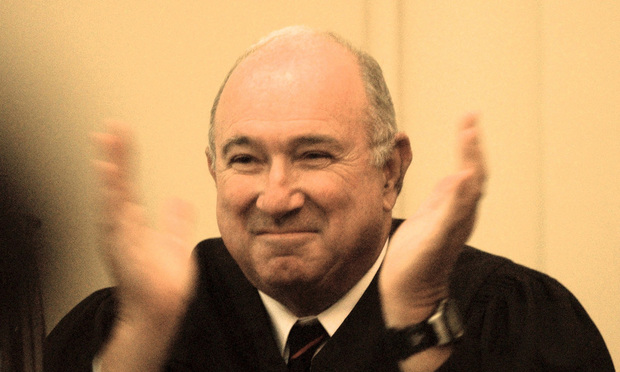Macon Judge Nixes Class Certification in Allstate Lawsuit Over Lost-Value Property Claims
The putative class action claims Allstate breached homeowners' policies by failing to assess and pay for diminished value after damaged properties have been repaired.
April 07, 2020 at 06:13 PM
5 minute read
 Senior District Judge Hugh Lawson, U.S. District Court for the Middle District of Georgia. (Photo: Beau Cabell/ Macon Telegraph)
Senior District Judge Hugh Lawson, U.S. District Court for the Middle District of Georgia. (Photo: Beau Cabell/ Macon Telegraph)
A federal judge in Macon denied class certification to plaintiffs seeking to hold Allstate Insurance liable for claims it failed to assess homeowners for the lost value they suffered due to the "stigma" of some covered property damage that was repaired.
The April 7 ruling by Senior Judge Hugh Lawson said the claims by various members of the purported class would be "too factually dissimilar to adjudicate uniformly," Lawson wrote, and any diminution in value "may vary widely between these types of losses."
The putative class action, filed on behalf of Calhoun couple Barbara and Benny Morrow, said their home first suffered foundational and structural damage in 2010 and made a claim to Allstate, which paid more than $50,000 to cover repairs.
In 2015, the Morrows' home suffered interior water damage and mold; Allstate again covered the loss, paying more than $9,000 for repairs.
But the inquirer failed to assess or pay for diminution in the property's value, according to the complaint.
"Despite the fact that its homeowner's policies of insurance provide coverage for diminution in value," the complaint said, Allstate "systematically fails to assess for and pay diminution in value in first-party physical damage claims and fails to establish procedures to handle diminution in value claims."
The suit said Allstate's "conduct has been, and is, in violation of Georgia law and contrary to the terms, conditions, and obligations of its own contracts of insurance."
The complaint named several Allstate entities and sought certification for all Georgia homeowners formerly or currently insured by Allstate who had filed claims for water, mold, fire, foundational or structural damage from 2010 onward and for whom the insurer had not assessed any diminution in the property's value.
Allstate sought to have the suit dismissed, arguing among other things that it was time-barred, that the Morrows had not demonstrated that their property had lost any value and that their policy did not require it to cover any such diminution.
In 2017 Lawson said the Morrows' amended complaint was sufficient to survive summary judgment and allowed it to proceed.
His recent order denying class certification said the case presented two issues: whether Allstate was required to assess for diminution of value and whether it actually paid for such diminution.
"Defendants here seek to defend against the alleged breach of contract by demonstrating that the plaintiffs' property in fact suffered no diminution in value, which would moot their failure to assess claim," Lawson wrote.
"And defendants intend to defend other class members' claims similarly," he continued. "That course of litigation is unlikely to produce common answers or a common resolution among all class members."
"Vast dissimilarities exist between the types of physical damage sustained by the properties in the proposed class," said Lawson. "The proposed class encompasses property damage ranging from toxic mold to water damage from an overflowing toilet. Public perception of the properties' values—and ultimately the diminution in value attributable to each property—may vary widely between these types of losses."
Thus, he said, "factual differences and uncertainties among class members make class-wide resolution implausible."
The Morrows' counsel includes Richard Kopelman and Clint W. Sitton of the Kopelman Sitton Law Group; Sandy Springs solo C. Cooper Knowles; and James Bradley, Michael Brickman and Nina Britt of Richardson, Patrick, Westbrook & Brickman in Mt. Pleasant, South Carolina.
In an email, Kopelman said the ruling did not follow with several prior decisions regarding insurers' obligations on diminution of value.
"Plaintiffs respect the court's ruling; however, they do not believe it comports with the long-standing Georgia law established by Mabry v. State Farm or Royal Capital v. Maryland Casualty, or rulings in Thompson v. State Farm, a similar matter where class certification was granted before the case ultimately was resolved," said Kopelman.
He said they are currently weighing their options, including a possible appeal.
Allstate's team of Dentons lawyers includes Nathan Garroway and Jeffrey Zachman in Atlanta, and Richard Fenton, Mark Hanover and Jacqueline A. Giannini from the Chicago office.
None of the lawyers responded to requests for comment Tuesday.
This content has been archived. It is available through our partners, LexisNexis® and Bloomberg Law.
To view this content, please continue to their sites.
Not a Lexis Subscriber?
Subscribe Now
Not a Bloomberg Law Subscriber?
Subscribe Now
NOT FOR REPRINT
© 2025 ALM Global, LLC, All Rights Reserved. Request academic re-use from www.copyright.com. All other uses, submit a request to [email protected]. For more information visit Asset & Logo Licensing.
You Might Like
View All
Insurer Not Required to Cover $29M Wrongful Death Judgment, Appeals Court Rules

Trying to Reason With Hurricane Season: Mediating First Party Property Insurance Claims


'I Thank You': Attorney Leverages Daily Report Article to Turn $42K Offer Into $600K Settlement
7 minute readLaw Firms Mentioned
Trending Stories
- 1States Accuse Trump of Thwarting Court's Funding Restoration Order
- 2Microsoft Becomes Latest Tech Company to Face Claims of Stealing Marketing Commissions From Influencers
- 3Coral Gables Attorney Busted for Stalking Lawyer
- 4Trump's DOJ Delays Releasing Jan. 6 FBI Agents List Under Consent Order
- 5Securities Report Says That 2024 Settlements Passed a Total of $5.2B
Who Got The Work
J. Brugh Lower of Gibbons has entered an appearance for industrial equipment supplier Devco Corporation in a pending trademark infringement lawsuit. The suit, accusing the defendant of selling knock-off Graco products, was filed Dec. 18 in New Jersey District Court by Rivkin Radler on behalf of Graco Inc. and Graco Minnesota. The case, assigned to U.S. District Judge Zahid N. Quraishi, is 3:24-cv-11294, Graco Inc. et al v. Devco Corporation.
Who Got The Work
Rebecca Maller-Stein and Kent A. Yalowitz of Arnold & Porter Kaye Scholer have entered their appearances for Hanaco Venture Capital and its executives, Lior Prosor and David Frankel, in a pending securities lawsuit. The action, filed on Dec. 24 in New York Southern District Court by Zell, Aron & Co. on behalf of Goldeneye Advisors, accuses the defendants of negligently and fraudulently managing the plaintiff's $1 million investment. The case, assigned to U.S. District Judge Vernon S. Broderick, is 1:24-cv-09918, Goldeneye Advisors, LLC v. Hanaco Venture Capital, Ltd. et al.
Who Got The Work
Attorneys from A&O Shearman has stepped in as defense counsel for Toronto-Dominion Bank and other defendants in a pending securities class action. The suit, filed Dec. 11 in New York Southern District Court by Bleichmar Fonti & Auld, accuses the defendants of concealing the bank's 'pervasive' deficiencies in regards to its compliance with the Bank Secrecy Act and the quality of its anti-money laundering controls. The case, assigned to U.S. District Judge Arun Subramanian, is 1:24-cv-09445, Gonzalez v. The Toronto-Dominion Bank et al.
Who Got The Work
Crown Castle International, a Pennsylvania company providing shared communications infrastructure, has turned to Luke D. Wolf of Gordon Rees Scully Mansukhani to fend off a pending breach-of-contract lawsuit. The court action, filed Nov. 25 in Michigan Eastern District Court by Hooper Hathaway PC on behalf of The Town Residences LLC, accuses Crown Castle of failing to transfer approximately $30,000 in utility payments from T-Mobile in breach of a roof-top lease and assignment agreement. The case, assigned to U.S. District Judge Susan K. Declercq, is 2:24-cv-13131, The Town Residences LLC v. T-Mobile US, Inc. et al.
Who Got The Work
Wilfred P. Coronato and Daniel M. Schwartz of McCarter & English have stepped in as defense counsel to Electrolux Home Products Inc. in a pending product liability lawsuit. The court action, filed Nov. 26 in New York Eastern District Court by Poulos Lopiccolo PC and Nagel Rice LLP on behalf of David Stern, alleges that the defendant's refrigerators’ drawers and shelving repeatedly break and fall apart within months after purchase. The case, assigned to U.S. District Judge Joan M. Azrack, is 2:24-cv-08204, Stern v. Electrolux Home Products, Inc.
Featured Firms
Law Offices of Gary Martin Hays & Associates, P.C.
(470) 294-1674
Law Offices of Mark E. Salomone
(857) 444-6468
Smith & Hassler
(713) 739-1250






